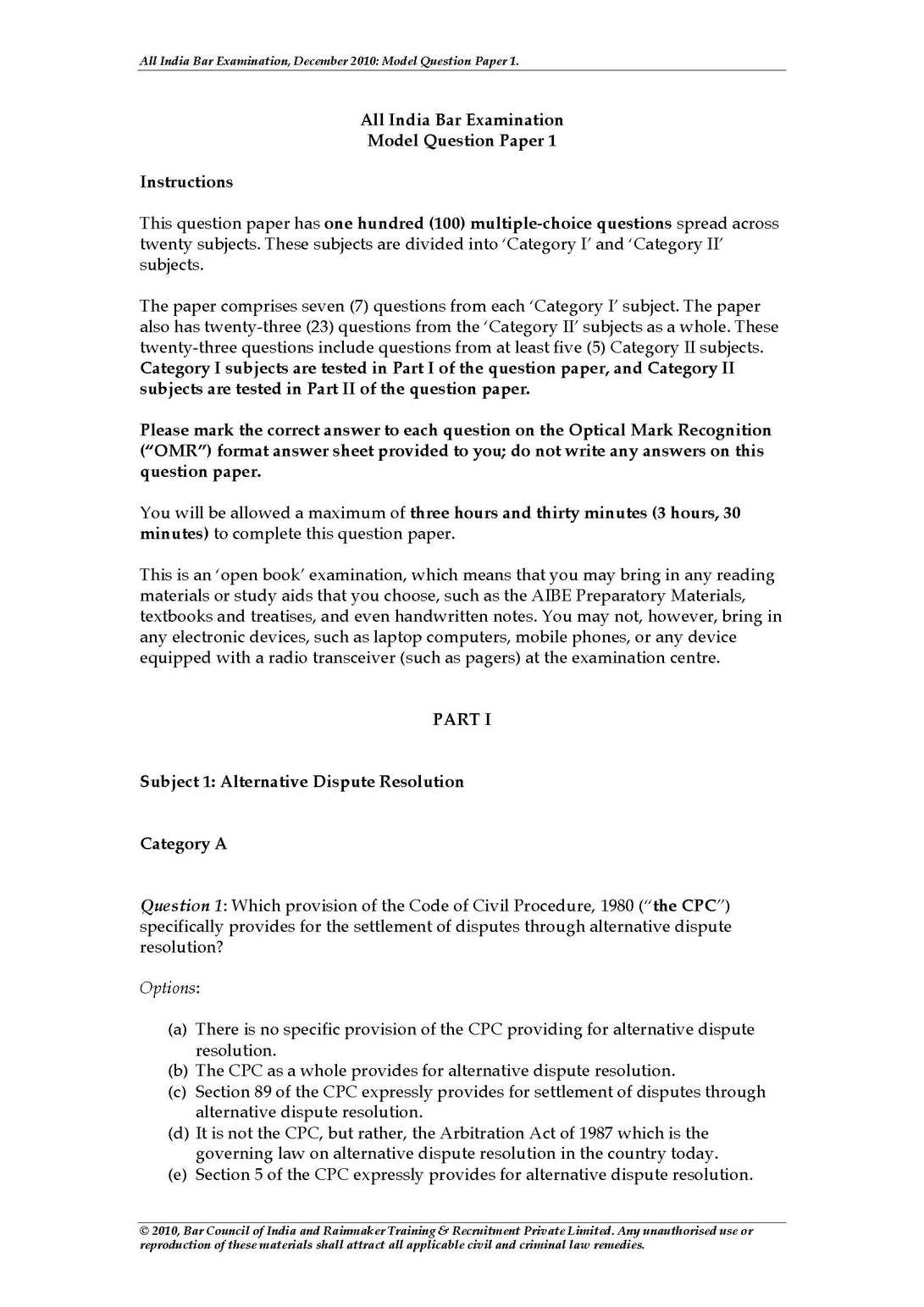|
#1
September 3rd, 2016, 03:08 PM
| |||
| |||
| All India Bar Exam Question Paper In Hindi
I requires the Model Question Paper of All India Bar Examination while preparing for exam . So please provide this paper here / As per your request I am here providing you Model Question Paper of All India Bar Examination. Model Question Paper: Question 1: Which provision of the Code of Civil Procedure, 1980 (“the CPC”) specifically provides for the settlement of disputes through alternative dispute resolution? Options: (a) There is no specific provision of the CPC providing for alternative dispute resolution. (b) The CPC as a whole provides for alternative dispute resolution. (c) Section 89 of the CPC expressly provides for settlement of disputes through alternative dispute resolution. (d) It is not the CPC, but rather, the Arbitration Act of 1987 which is the governing law on alternative dispute resolution in the country today. (e) Section 5 of the CPC expressly provides for alternative dispute resolution. Question 2: Which of the following most accurately describes the requirements of a valid arbitration agreement under the Arbitration and Conciliation Act, 1996 (“the Arbitration Act, 1996”)? Options: (a) There is no need for parties to a dispute to frame an arbitration agreement under the Arbitration Act, 1996 (“the Arbitration Act”). (b) The parties need not concern themselves with the validity of the arbitration agreement. (c) The provisions of the Indian Contract Act, 1872 (“the Contract Act”), do not apply to such agreements. (d) The arbitration agreement must be valid as per the Contract Act, and the parties must be competent to contract. (e) The only requirement is that the parties must be competent to contract; all other requirements of validity under the Contract Act are unnecessary. Question 3: Which of the following most accurately describes the enforceability of an arbitral award? Options: (a) An arbitral award is not binding on the parties; they may choose to follow it if they so wish. (b) An arbitral award, unless set aside by a court of competent jurisdiction, is enforceable in the same manner as a decree of a civil court. (c) An arbitral award can only be enforced if there is a specific direction from a court that it should be so enforced. (d) An arbitral award can be enforced, but only upon an application by the arbitrator to a court to do so. (e) An arbitral award cannot be enforced in the case of commercial disputes. Question 4: Under the Arbitration Act, does the arbitrator have to provide reasons for the award? Options: (a) An arbitrator must always provide reasons for the award. (b) An arbitrator need never provide reasons for the award. (c) An arbitrator need only provide reasons for the award when specifically requested by the parties to do so. (d) An arbitrator must always provide reasons for the award, unless the parties have agreed that no reasons are to be given, or the award is an arbitral award on agreed terms. (e) An arbitrator must always provide reasons for the award, and the only exception to this rule is in the case of an arbitral award on agreed terms. Question 5: A, a party to a dispute, consented to arbitration by an arbitral tribunal in accordance with the terms of the arbitration agreement. A participated in the arbitration proceedings, but later wishes to take the plea that there was no arbitration clause in her agreement with the other party to the dispute, B. Can A take such a plea? Principle: In view of the principles of acquiescence and estoppel, it is not permissible for a party to challenge an arbitration clause after proceeding in an arbitration proceeding. Options: (a) A can take the plea that there was no arbitration clause at any time after the award of the tribunal. (b) A has acquiesced to the arbitration by participating in the arbitration proceedings, and cannot now take the plea that there was not arbitration clause. (c) A cannot take the plea that there was no arbitration clause, but can choose whether or not to follow the arbitral award. (d) A can take the plea that the arbitration proceedings were not validly conducted. (e) A can take the plea that there was no arbitration clause only if B agrees to do the same.  Here is the attachment. Last edited by Neelurk; April 22nd, 2020 at 09:54 AM. |